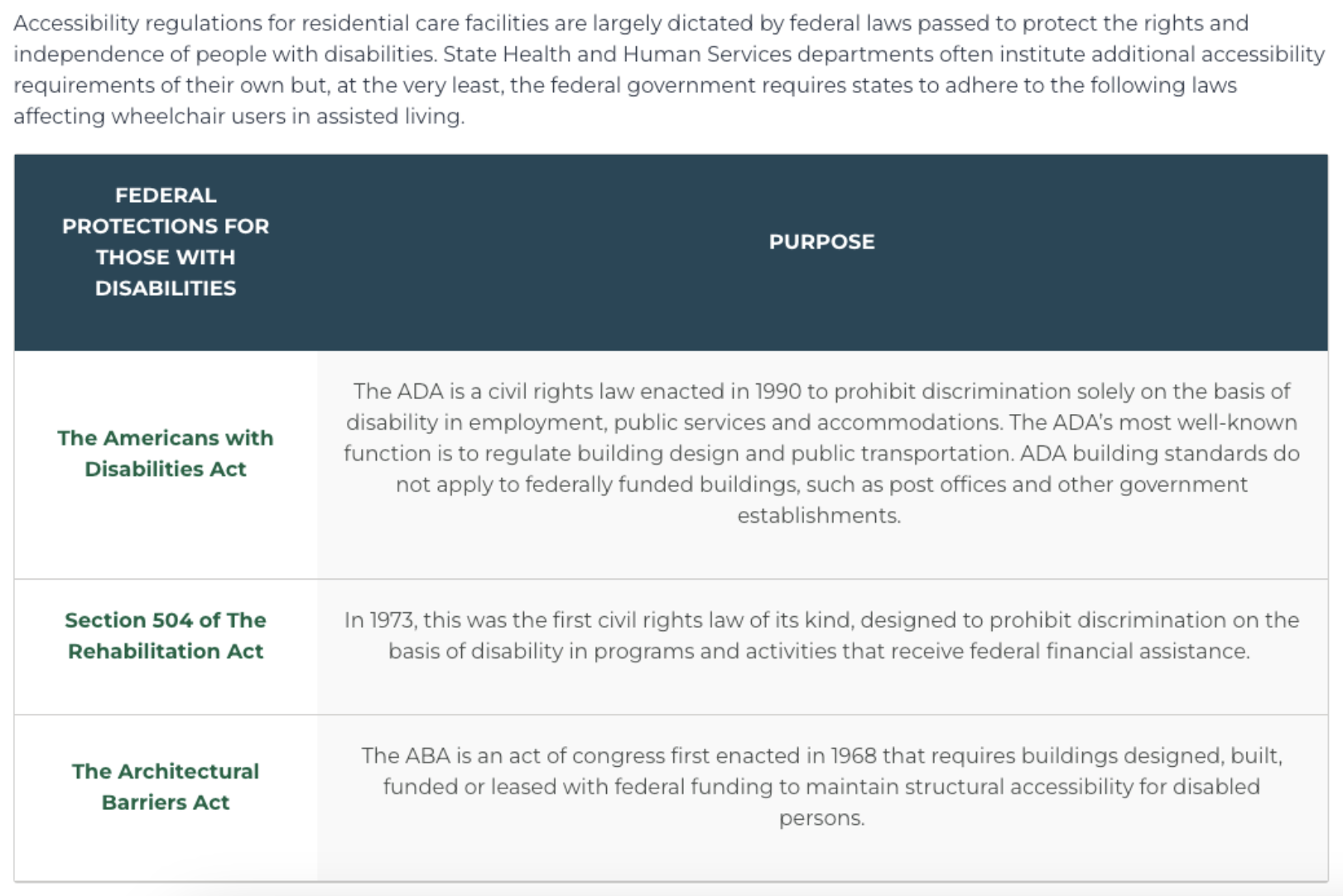
Assisted living options for wheelchair users

PeopleImages.com - Yuri A // Shutterstock
Assisted living options for wheelchair users
There is a wide variety of lifestyle options for wheelchair users, and that remains true into retirement age. One of the more supportive and comfortable living situations for a wheelchair-bound senior is an assisted living community. But this has not always been the case.
Until the early 1990s, federal laws protecting the rights of people with disabilities were not always enforced. However, in 1990, the federal government passed the Americans with Disabilities Act, or ADA, which overhauled the country's building practices.
But some assisted living facilities use state laws as a loophole. Some state regulations contain vague or outdated language, and facilities have exploited these regulations to avoid accepting residents who use wheelchairs. Discriminatory practices against wheelchair users can now be challenged, as it is a violation of the ADA.
The benefits that assisted living can offer wheelchair users have the potential to boost their quality of life. Caring.com shares a guide to help determine senior living mobility options.
Key Takeaways
- Assisted living for wheelchair-bound seniors involves services like personal care, accessible spaces, and wheelchair-friendly transportation.
- The Americans with Disabilities Act protects wheelchair users from assisted living facilities (ALFs) discriminating against them.
- It's illegal for assisted living communities to turn down a resident just because they use a wheelchair, but ALFs are allowed to restrict the mobility levels they'll accept in a resident.
What Is Assisted Living?
Assisted living facilities are long-term residential communities. They offer a higher care level than independent living. Assisted living residents receive help with activities of daily living, or ADLs like personal grooming tasks. Other assisted living services include physical therapy, communal meals, and housekeeping services. Some facilities may have activity rooms, salons, or fitness centers.
Assisted living communities accommodate residents with low to intermediate levels of care needs. While it's illegal for a facility to turn down a resident on the basis of wheelchair use, if that senior needs more mobility assistance than the assisted living facility can provide, the ALF may not extend an offer of residency.
For residents that may need more help, there is an option to hire a home care aide to come to the facility. If someone needs extensive medical care, a nursing home may be a better option. Those with memory issues may want to look into memory care.
How Much Does Assisted Living Cost?
Assisted living costs $4,200/month, based on Caring.com's proprietary senior living cost data. This amount covers the resident's apartment, meals, Wi-Fi, cable, housekeeping, and laundry services.
However, costs can vary depending on location and the amount of care a resident needs. Services such as occupational or physical therapy—which a senior in a wheelchair may require—may cost extra. Other facilities may also provide amenities like an on-demand concierge for an extra fee.
Can Someone Be In a Wheelchair In Assisted Living?
The short answer is yes. A person can be in a wheelchair in assisted living. This is thanks to the ADA, a federal law that prohibits discrimination on the basis of a disability.
However, assisted living facilities fall under state laws. (Unlike nursing homes, which are under federal regulations.) Because of this, some assisted living facilities may try to reject a resident based on the level of mobility assistance in assisted living they need, emboldened by the vague language in state regulations.
The section below offers a more detailed look at federal protections for people with disabilities.
Assisted Living Accessibility Regulations
![]()

Caring.com
Benefits of Assisted Living for Wheelchair Users
Compared to independent living, assisted living can provide a wider breadth of support. These services provide a safe and comfortable atmosphere for those using wheelchairs or other mobility aids. Services can include the following:
- Personal care services: Help with personal hygiene, which is standard in an assisted living facility, can reduce the stress of a disability. This can be especially important for those who live alone.
- Safe and accessible spaces: Assisted living can provide many safety features for seniors living with mobility aids. These features include wider doors and elevators, which can save on costs of modifying a home to make it wheelchair accessible.
- Built-in accessibility aids: The facility maintains and covers the cost of accessibility aids, such as grab bars and personal response systems.
- Social space accessibility: State law often requires social spaces to be accessible to people with disabilities. Thus, people in wheelchairs can socialize with their community in a comfortable, safe way.
- Transportation: Assisted living facilities provide transportation for residents. This includes vehicles that are wheelchair accessible.
- Physical therapy: On-site physical therapy is often offered with assisted living. The exercises provided can be of great help to those in senior living with mobility limitations.
Mobility Restrictions in Assisted Living Facilities
It is true that assisted living communities must be wheelchair accessible. And mobility assistance in assisted living is available. But facilities have some restrictions on the mobility levels they can accommodate.
Ambulating is an ADL, which is a service provided by assisted living. This is the action of moving from one position to another. It is fine if a resident needs some help with this type of mobility, but if there is a need for more extensive mobility assistance in assisted living, then a nursing home may be the best option for them.
Nursing home care may also be the best senior living option if a person has comorbid conditions that require more advanced care.
Who Should Use Assisted Living?
The ideal assisted living resident may be a wheelchair user who can be helped to stand and walk around, who can transfer themselves to and from their chair, or who can be lifted with the assistance of only one direct care aide.
Eligible assisted living residents can receive assistance with tasks like:
- Bathing and dressing
- Toileting
- Dental care
- Standing and walking
- Laundry
- Running errands
- Taking medicines
Who Should Not Use Assisted Living?
People who can live independently shouldn't use assisted living, and neither should people who are likely to remain healthy for the foreseeable future, as they may incur high costs for unneeded care if they move into assisted living.
On the other side of the care spectrum, people who are permanently bedridden or require significant, ongoing medical care are also not good candidates for assisted living. These more dependent individuals may require skilled nursing care or 24-hour supervision, neither of which are offered by assisted living communities.
Assisted living is unsuitable for those who:
- Cannot perform most or all of their personal care tasks
- Rely on medical equipment that they cannot operate or maintain
- Cannot follow directions or move to safety in emergency situations
- Have active tuberculosis
- Are chronically bedbound
Financial Support Options for Assisted Living
Residential care can be a great choice for older adults with mobility challenges. But it poses a major monetary obligation. Fortunately, there are financial support options to lessen the costs of assisted living.
- Medicaid waivers: If you are a Medicaid recipient, Medicaid waivers may be available to help cover assisted living costs. The waiver program varies from state to state. These waivers usually cover the cost of a wheelchair.
- Medicare: Medicare Part B is the most important part of Medicare for wheelchair users. It will cover all but 20% of the total Medicare-approved costs for a needed device, such as a wheelchair. But deductibles must be paid up front.
- Social Security: Social Security benefits are for those who are unable to work due to a disability or who are working and are low-income. The SSA will give coverage based on how severe and debilitating the disability is. Learn how Social Security is calculated .
- VA benefits: The Department of Veterans Affairs provides funding for assisted living and other residential care facilities. The VA also covers the costs of mobility aids for those who qualify.
Read up on government aid options or look into long-term care insurance or reverse mortgages to help with assisted living costs.
Get Help Finding Assisted Living for Wheelchair Users
Finding the right care setting for budget and particular needs can be a daunting task, but it doesn't have to be done alone. A team of senior care advocates is available at the Caring.com call center to help seniors and wheelchair users all over the country find local care options. To find an appropriate residence in your area, speak with a Caring.com Family Advisor toll free at (800) 973-1540.
Find an interactive map linking to resources by state here.
Bottom Line
Assisted living can be an ideal option for many wheelchair users. The ADA allows facilities to be accessible for all residents. Personal care services and transportation are just some of the benefits. Additionally, many people qualify for programs that can help with the costs of assisted living.
Frequently Asked Questions
What is considered wheelchair-bound?
Being wheelchair-bound means you cannot walk due to illness or injury, and you must use a wheelchair to move around. Assisted living for wheelchair-bound people is possible if the person is considered active wheelchair-bound. Active wheelchair-bound people can move about their space in their chair by themselves. Passive wheelchair-bound people cannot move their wheelchairs on their own.
Can you go to assisted living if you can't walk?
Yes. If you need the aid of a cane, walker, or wheelchair, you can live in an assisted living facility. This is because the ADA prevents discrimination based on a disability.
What is the best age to move to assisted living?
The right time to move into assisted living is not determined by age. It depends on each person's circumstances. If someone needs help with personal hygiene or has certain medical conditions, it might be time for assisted living.
This story was produced by Caring.com and reviewed and distributed by Stacker.
